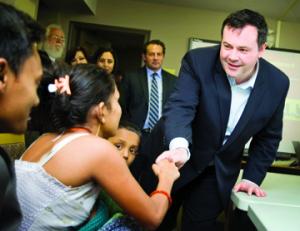Mabell, Dave
LETHBRIDGE HERALD
dmabell@lethbridgeherald.com
 Planned cuts for health coverage could put refugees’ lives at risk in Lethbridge. That’s the warning from immigrant and refugee workers here, but the nation’s minister of immigration is not heeding it.After living in refugee camps for 20 years or more, Lethbridge settlement officers point out, many refugees arrive with physical or mental health issues. Sarah Amies says if some are cut off their medications for diabetes, severe asthma or heart conditions, the results could be fatal. But Jason Kenney, visiting Lethbridge for a series of meetings and a political fundraising meal, said the cuts are fair and won’t be reversed. And they won’t affect government sponsored refugees who come here, he maintained.
Planned cuts for health coverage could put refugees’ lives at risk in Lethbridge. That’s the warning from immigrant and refugee workers here, but the nation’s minister of immigration is not heeding it.After living in refugee camps for 20 years or more, Lethbridge settlement officers point out, many refugees arrive with physical or mental health issues. Sarah Amies says if some are cut off their medications for diabetes, severe asthma or heart conditions, the results could be fatal. But Jason Kenney, visiting Lethbridge for a series of meetings and a political fundraising meal, said the cuts are fair and won’t be reversed. And they won’t affect government sponsored refugees who come here, he maintained.
“I think the measures we are taking have very broad public support,” the immigration minister told reporters. Canadians, he said, want “fairness” in their health system, with no extra help for people who’ve just arrived in the country.
As announced earlier this spring, Kenney’s cuts will include prescriptions for some refugees living with diabetes, hypertension or other life-threatening conditions. They’ll also eliminate dental and vision care.
Along with closure of the city’s immigration office, he said they’re essential if the Conservative government is to eliminate its deficits.
Amies, who’s seen hundreds of refugees successfully settle into southern Alberta in recent years, says many arrive with serious issues after surviving many years in a cramped refugee camp. Regaining their health is a first step, she says, and tooth decay is one of the issues.
“How can you concentrate in school when you’re in that much pain?” she asks. “How can you learn when you don’t have the glasses you need?”
Others bring a severe asthma condition. If they can’t get an inhaler, how do they survive?
Some refugees also need an neuro-psychological assessment, Amies added. Without that evaluation, they may never keep a job.
Children and seniors won’t be impacted, she said, but working-age adults will be.
“These cuts to the health care are going to cause our refugees a lot of trouble.”
But Kenny, speaking later, said about 6,000 government-sponsored refugees who arrive each year won’t be affected by the changes. Some of the 2,500 asylum-seekers will be, however.
Most of those are headed to Toronto, he added – and few to southern Alberta.
Provinces are responsible for health care, Kenney pointed out. But federal programs will continue to assist refugees before they qualify for those services.
Despite closure of the city’s immigration office, he maintained refugees and immigrants coming to southern Alberta can still expect fast service from the regional office in Calgary.
“We’re going to provide better service online.”
